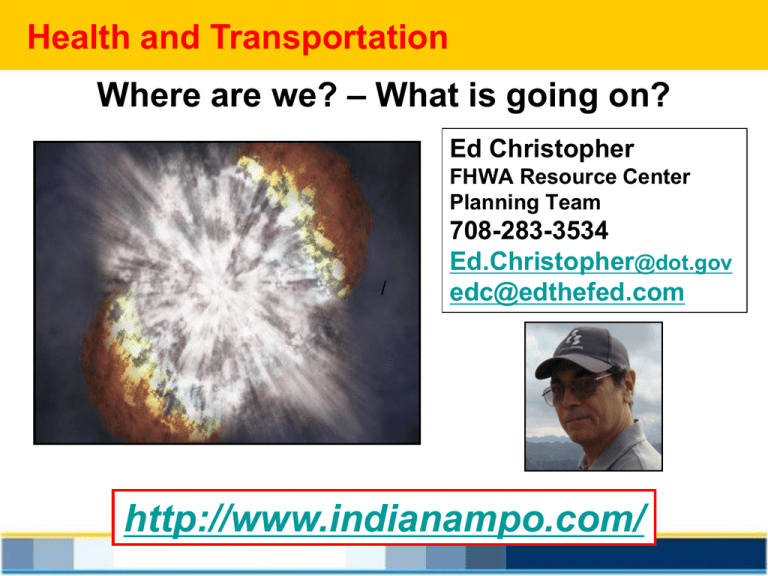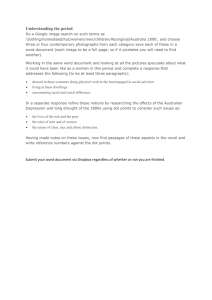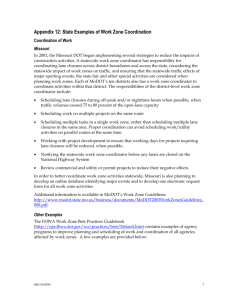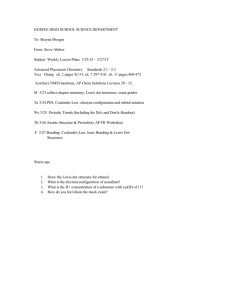Transportation and Public Health
advertisement

Health and Transportation Where are we? – What is going on? Ed Christopher FHWA Resource Center Planning Team / 708-283-3534 Ed.Christopher@dot.gov edc@edthefed.com http://www.indianampo.com/ Why Public Health & Transportation? Why is USDOT, FHWA, FTA or NHTSA interested? DOT is the steward of the transportation system The transportation system can promote healthy lifestyles Aristotelian Transportation systems have the potential to significantly impact the health of their users, both positively and negatively. As the steward of the Nation’s transportation system, USDOT plays a key role in mitigating the negative health impacts of transportation and maximizing the positive influences through programs that protect the environment, improve air quality, reduce the prevalence and severity of crashes, and provides options for mode choice. Moreover, FHWA and FTA, for example, oversee a transportation planning process that ensures safe, equitable, and efficient access to vital services for all users of the transportation system. What do we mean--Health & Transportation? TRANSPORTATION • Air Pollution • Motor Veh Crashes • Urban Form • Noise • Water Quality • Bike/Ped Injuries • Climate Change • Mental Health • EJ • Access to Stuff • Social Capital PUBLIC HEALTH Health is a state of complete physical, mental and social wellbeing and not merely the absence of disease or infirmity Public Health is the science and art of preventing disease, prolonging life and promoting health through the organized efforts and informed choices of society, organizations, public and private, communities and individuals http://www.who.int/en/ Social Capital (Quality of Life) The individual and communal time and energy that is available for such things as community improvement, social networking, civic engagement, personal recreation, and other activities that create social bonds between individuals and groups. Circumstances that prevent or limit the availability of social capital for a community and its members can have a negative effect on the health and well-being of the members of that community. These negative effects on health and well-being can in turn have negative effects on the community as a whole. http://www.cdc.gov/healthyplaces/terminology.htm#p Health Origins at FHWA Sept 2011 Health in Transportation: a Review of Current FHWA Practice (internal report done by Volpe) Jan 2012 HinT Working group formed (12 FHWA Offices) Dec 2012 HinT expanded to FTA, NHTSA and OST Working Definition for HinT The provision of safe and reliable mobility and access influences, and is influenced by, health. The objectives of the Working Group are to (1) identify and recognize aspects of existing FHWA programs that relate to health and (2) build awareness of these programs and their impacts with FHWA leadership, staff, and stakeholders. HinT Highlights Early Accomplishments This document provides information on FHWA programs, initiatives, tools, and resources that influence or are influenced by health. Although FHWA does not have a single, specific program that focuses solely on health, it is implicit in a broad range of existing programs May 2013 http://www.fhwa.dot.gov/planning/health_in_transportation/resources/moving_healthy.cfm HinT Highlights Continued A Website • • • • Working Group FAQs Resources Annotated Links http://www.fhwa.dot.gov/planning/health_in_transportation Current HinT Activities • Coordination/Information Sharing, Internal MailList • Annotated Bibliography • Advanced and Detailed FAQs Planning for Healthy Communities White Papers (Metro and State) Framework for Incorporating Health in the Transportation Corridor Planning Process Meetings with CDC White Papers ~ Metro Area Report Describes some Frameworks/typologies for MPO involvement Presents 4 in depth case studies (Nashville, PSRC, SACOG, SANDAG) Discusses the context (key players, Data and Tools, Regulatory/Programmatic Setting, and Funding Sources http://www.planning.dot.gov/documents/Volpe_FHWA_MPOHealth_12122012.pdf For me the Metro area report is a… Intro to Transportation Planning and its Process with a focus on Health “Metropolitan area planning products and requirements can be vessels to formalize or communicate health considerations” But it does bring Health in with specifics… 11 Nashville Travel Survey Health Questions Since the Report was done • Daily time spent sitting on a typical weekday • Daily time spent sitting on a specific weekday (last Wednesday) • Overall level of physical activity • Overall level of health • Overall diet health • Height and weight http://www.nashvillempo.org/docs/research/Nashville_Final_Report_062513.pdf 12 White Papers ~ State DOT Report California DOT (Caltrans) Iowa DOT (IADOT) Massachusetts DOT (MassDOT) Minnesota DOT (MnDOT) North Carolina DOT (NCDOT) https://www.fhwa.dot.gov/planning/health_in_transportation/resources/s tatewide_healthy_communities/hep14032.pdf 13 State DOT Report 14 Framework for…. Incorporating Public Health in the Transportation Corridor Planning Process ($400K) 2013 to Mid 2016 ICF is contractor Incorporated into Plan Works (formerly TCAP) https://www.fhwa.dot.gov/planning/health_in_transportation/research_efforts/ 15 Where is the Framework Today? Being Beta Tested (2014-2015) • • • • • Akron Metro Regional Transit Authority (METRO) Central Oklahoma Transportation and Parking Authority (EMBARK) Delaware Valley Regional Planning Commission (DVRPC) East Central Wisconsin Regional Planning Commission (ECWRPC) Tennessee Department of Transportation (TDOT) 16 Framework for…. Akron, OH Appleton, WI ULI Healthy Corridors Project • • • • Develop and refine approaches for creating healthy corridors Identify approaches that work Leverage new understanding around effective approaches Disseminate lessons learned throughout the ULI networks http://uli.org/research/centers-initiatives/building-healthy-placesinitiative/healthy-corridors ULI Healthy Corridor Locations Los Angeles Boise Nashville Denver 19 Meetings with CDC Two Projects of note Linking of transportation variables to NHIS National Personal Household Travel Survey Staffs working together Bike group How funding programs work NHTS: Health Condition, Walking/Biking for exercise, Walking/Biking prohibitions, difficulty traveling outside, mobility aids, physically active 20 One other BIG thing TRANSPORTATION & HEALTH TOOL Loaded with Indicators Goals • Help transportation decision-makers understand public health • Inform health-supportive transportation policies and project decisions • Strengthen collaborations between Trans. and PH sectors CDC and USDOT Jointly Funded Project • • • • Uses Online pre-loaded with region and state data Assess how state/ MPO is performing/where to improve Offer policy recommendations Evidence base for integrating PH and Trans. Scheduled release, October 20, 2015 Transportation Health Tool • • • • • • • • • • • • • • 14 Indicators Alcohol-impaired Fatalities Commute Mode Shares Complete Streets Policies Housing and Transportation Affordability Land Use Mix Person Miles Traveled by Mode Physical Activity from Transportation Proximity to Major Roadways Public Transportation Trips per Capita Road Traffic Fatalities by Mode Road Traffic Fatalities Exposure Rate Seat Belt Use Use of Federal Funds for Bike and Ped Efforts Vehicle Miles Traveled per Capita 22 Transportation Health Tool https://stage8.dot.gov/mission/health/transportation-and-health-tool 23 Transportation Health Tool Indicator Profiles ~ Description ~ Transportation and Health Connection ~ About the Data ~ Moving Forward ~ Related Strategies ~ References 24 Transportation Health Tool Strategies to Address Health ~ Description ~ Tie to indicators ~ Health Benefits ~ Resources-more Info ~ Evidence Base ~ Field Examples 25 Transportation Health Tool Scoring Methodology ~ Raw Value ~ Score “0 to 100” ~ Percentile ~ Standardized “Z” Score ~ “Z” adjusted for outliers ~ Adjusted so a higher score is always better 26 Transportation Health Tool Indicator Indicators by Geography Commute Mode Share (Auto, Transit, Bike, Walk) Complete Streets DUI/DWI Fatalities Housing/Transportation Affordability Land Use Mix PMT (Auto, Walking) Physical Activity from Transportation Proximity to Major Roadways Road Traffic Fatalities (Auto, Bike, Ped) Seat Belt Use Traffic Fatalities Exposure Rate (Auto, Bike, Ped) Transit Trips per Capita Use of Federal Funds for Bike/Ped VMT per Capita Geography State MSA UZA X X X X X X X X X X X X X X X X X X X X X X https://stage8.dot.gov/mission/health/transportation-and-health-tool 27 Transportation Health Tool https://stage8.dot.gov/mission/health/transportation-and-health-tool 28 Transportation Health Tool 29 Transportation Health Tool https://stage8.dot.gov/mission/health/transportation-and-health-tool 30 Transportation Health Tool https://stage8.dot.gov/mission/health/transportation-and-health-tool 31 THT ~ State of Indiana Indicators Commute Mode Share – Auto Raw Value = 92.1% Score = 20 Commute Mode Share – Transit Raw Value = 1.1% Score = 31 Commute Mode Share – Bicycle Raw Value = 0.5% Score = 50 Commute Mode Share – Walk Raw Value = 2.2% Score = 27 Complete Streets Policies Raw Value = No policy Score = 0 DUI/DWI Fatalities per 100,000 Residents Raw Value = 3.5 Score = 49 Person Miles of Travel by Private Vehicle Raw Value = 26,200 Score = 76 Person Miles of Travel by Walking Raw Value = 132 Score = 14 Physical Activity from Transportation Raw Value = 7.08 Score = 27 Proximity to Major Roadways Raw Value = 0.01% Score = 97 Road Traffic Fatalities/100,000 Residents – Auto Raw Value = 10.6 Score = 46 Road Traffic Fatalities/100,000 Residents – Bicycle Raw Value = 0.2 Score = 41 Road Traffic Fatalities/100,000 Residents – Pedestrian Raw Value = 0.9 Score = 78 Seat Belt Use Raw Value = 0.94 Score = 90 Road Traffic Fatalities Exposure Rate – Auto Raw Value = 11.5 Score = 51 Road Traffic Fatalities Exposure Rate – Bicycle Raw Value = 42.3 Score = 40 Road Traffic Fatalities Exposure Rate – Pedestrian Raw Value = 40.5 Score = 53 Transit Trips per Capita Raw Value = 11.7 Score = 55 Use of Federal Funds for Bike and Ped Efforts Raw Value = 3.10% Score = 90 Vehicle Miles Traveled per Capita Raw Value = 11,737 Score = 18 32 THT ~ Muncie MSA Commute Mode Share – Auto Raw Value = 89.5% Score = 61 Commute Mode Share – Transit Raw Value = 1.7% Score = 59 Commute Mode Share – Bicycle Raw Value = 1.0% Score = 80 Commute Mode Share – Walk Raw Value = 5.2% Score = 95 Complete Streets Raw Value = No policy Score = 0 DUI/DWI Fatalities per 100,000 Residents Raw Value = 2.6 Score = 61 Housing and Transportation Affordability Raw Value = 51.9% Score = 48 Land Use Mix Raw Value = 0.49 Score = 47 Proximity to Major Roadways Raw Value = 0.00% Score = 100 Road Traffic Fatalities/100,000 Residents – Auto Raw Value = 8.8 Score = 57 Road Traffic Fatalities/100,000 Residents – Bicycle Raw Value = 0.0 Score = 89 Road Traffic Fatalities/100,000 Residents – Pedestrian Raw Value = 0.3 Score = 95 Road Traffic Fatalities Exposure Rate – Auto Raw Value = 9.8 Score = 57 Road Traffic Fatalities Exposure Rate – Bicycle Raw Value = 0.0 Score = 97 Road Traffic Fatalities Exposure Rate – Pedestrian Raw Value = 6.6 Score = 98 33 THT ~ Muncie Urbanized Area 34 Transportation Health Tool https://stage8.dot.gov/mission/health/transportation-and-health-tool This URL will change when the site is OFFICIALLY released on October 28, 2015 35 How Does Transportation Affect PH? Article with MPO and state DOT examples of where public health is an active component of the organization MPOs tend to be programmatic focused State DOTs tend to be process and goal oriented. https://www.fhwa.dot.gov/publications/publicroads/13mayjun/05.cfm What about Health Impact Assessments? HIA is a process to analyze and evaluate the potential effects that a proposed policy or project may have on human health and to help determine the best approach to mitigate those effects Major Steps 1.Screen 2.Scope 3.Assess 4.Recommend 5.Report Results 6.Monitor/Evaluate http://www.cdc.gov/healthyplaces/hia.htm http://www.pewtrusts.org/en/projects/health-impact-project/research-andanalysis/toolkits-guides-and-data-sources Who has done HIAs? 54 Completed Transportation-Related HIAs in the U.S., 2004–2015 (18 in Progress) Source: Health Impact Project HIA database http://www.pewtrusts.org/en/projects/health-impact-project Proposed Bus Routes Expansion (Marion Cnty) IN Univ Dept of Public Health Marion County Health Department Indianapolis MPO Graduate level HIA course First half learned HIA Second half hands-on experience Students conducted a rapid assessment Focused on physical activity, obesity, and diabetes. http://www.pewtrusts.org/en/multimedia/data-visualizations/2015/hiamap/state/indiana/hia-of-a-proposed-expansion-of-bus-routes http://www.pewtrusts.org/en/projects/health-impact-project TRB Activities Formed 5 Years ago Co-Chairs Ed Christopher Eloisa Raynault formerly with APHA Typical committee activities Website ListServe (over 380 subscribers) http://www.chrispy.net/mailman/listinfo/H+T--Friends Follow @TRBhealth on Twitter Facebook https://www.facebook.com/groups/trbhealthandtransportation/ Newsletter, Research Statements, Paper Calls Review Papers, sponsor Sessions and Workshops http://www.trbhealth.org Notable progress http://www.trbhealth.org/highlights http://www.trbhealth.org TRNews Themed Issue Due out November 2015 Public Health and Transportation Innovation, Intervention and Introspection Sampling of articles Setting the Stage: Why Public Health (PH) and Transportation Health Impact Assessment. What is it? When, where and why do them? How to connect with the PH Community Health in Transportation: An MPO and State DOT Focus Incorporating Health in an MPO Planning Process Perspectives from the TRB Committees that sponsor the subcommittee …and more New Task Force January 2015 TRB approved a new Task Force Task Force on Arterials and Public Health (ADD55T) …to inform the Planning, Design, and Operation of arterials while considering the implications to Public Health -3 year Life -Vetted research agenda -Very broad support -Just forming https://www.mytrb.org/CommitteeDetails.aspx?CMTID=4403 All Roads Lead to the Future 2016 Annual Meeting Subcommittee Sunday Workshop Institutionalizing Health in Transportation Agencies Poster Session Innovations in Health and Transportation Subcommittee Meeting Task Force Meeting TRB Executive Board (Special Health focus) Surgeon General's Call to Action Surgeon General Announces His Call to Action to Promote Walking and Walkable Communities The U.S. Surgeon General's Call to Action campaign, called "Step It Up!," recognizes the importance of physical activity for people of all ages and abilities. "Step It Up" includes five strategic goals: 1)make walking a national priority; 2)design communities that make it safe and easy to walk for people of all ages and abilities; 3) promote programs and policies to support walking where people lie, learn, work, and play; 4) provide information to encourage walking and improve walkability; and 5) fill surveillance, research, and evaluation gaps related to walking and walkability. http://www.surgeongeneral.gov/library/calls/walking-andwalkable-communities 46 Social Determinants of Health Economic Stability Poverty -- Employment Food Security -- Housing Stability Education High School Graduation Enrollment in Higher Education Language and Literacy Early Childhood Ed. and Development Social and Community Context Social Cohesion -- Civic Participation Perceptions of Discrimination and Equity Incarceration/Institutionalization Health and Health Care Access to Health Care/ Primary Care Health Literacy Neighborhood and Built Environment Access to Healthy Foods Quality of Housing Crime and Violence Environmental Conditions http://www.healthypeople.gov/2020/topicsobjectives/topic/social-determinants-health 47 Thank you Is your MPO/DOT doing anything with Public Health? Let me know. Lets Talk Ed Christopher FHWA Resource Center Planning Team 708-283-3534 Ed.Christopher@dot.gov After December 31 edc@edthefed.com http://www.americashealthrankings.org/ http://www.countyhealthrankings.org/ https://stage8.dot.gov/mission/health/transportation-and-health-tool Step it Up! https://www.youtube.com/watch?v=mq3DxArKAEo




